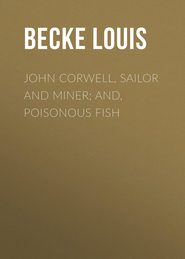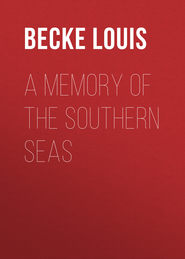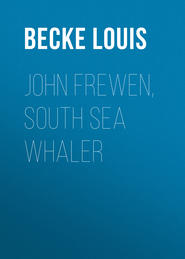По всем вопросам обращайтесь на: info@litportal.ru
(©) 2003-2024.
✖
Tom Wallis: A Tale of the South Seas
Настройки чтения
Размер шрифта
Высота строк
Поля
'That's what my father has often said, Mrs. Casalle. And I believe he was right.'
CHAPTER XVIII
TOGETHER AT LAST
One afternoon, after more than two weeks had passed, the whaling barque still lay quietly at anchor in Singavi Harbour, ready for sea again, and waiting only for a breeze. For, soon after the repairs were finished, the trade-wind had flickered and died away, and a 'furious calm,' as Mr. Burr, the chief mate, called it, had set in, and seemed likely to continue. The captain had started off early the previous morning to walk to the mission house at Alō, and spend a day or two shooting with Tom and Maori Bill, for the natives had assured him that there was not the slightest chance of anything more than the very lightest airs from the eastward for many days to come, and he decided that it was better to be lying at anchor instead of drifting away to the westward. And so, although Mr. Burr and his fellow-officers, to whom an idle day was an abomination and a vexation of spirit, grumbled exceedingly, they had to admit that the 'old man' was right after all. The two damaged boats had been repaired, and were now, as well as the one obtained from Tom and Bill, fit to be lowered again, should whales be seen whilst the ship was at anchor. Look-outs had been stationed on two of the highest points of the island, and a series of smoke-signals arranged, so that if by good luck a whale or whales should be sighted from the mountains, the boats would know where to look for them, if they were not visible from the ship.
The day had been intensely hot, and at five o'clock Mr. Burr and the second mate, as they sat under the awning on the poop deck, were eating oranges and pineapples with a steady determination to do some kind of work.
Presently a canoe came off from the beach and brought off the shore look-outs, who duly came aft and reported.
'See anything, you fellows?' asked the mate, stabbing a pineapple through with his knife and drawing it to him.
'Saw 'bout nine or ten finbacks close in under the south point 'bout an hour ago,' drawled one of the look-outs.
'Finbacks is pizen, and ain't fit to be mentioned to a decent man. Snakes and finbacks air a curse to humanity. But if we hev to lie here and rot much longer, and one of them comes foolin' around, I'm going to put an iron into him, and let him tow me all around this island for forty days and forty nights. See any blackfish?'
'Nary one. But there's a ship way out to the northward. Saw her early this morning. Reckon she ain't much nearer now. 'Bout fifteen mile off now.'
Mr. Burr displayed a faint interest, and then, being a good-natured, thoughtful man, said to his subordinate-
'Like to take a boat and pull round to the mission house and tell the old man? If that ship is bound to Fiji, she'll most likely pass between here and Alofi, and maybe he or the little woman might want to send a letter. You can stay all night if you like.'
The second mate was only too glad to get away from the ship for a night; and soon after supper he called his boat's crew and started, secretly hoping that on the way back in the morning he might raise a whale.
As the boat rounded the southern point of the island, a gentle, cooling breath of air came from the eastward, and the mate sniffed it approvingly, not because it was laden with the sweet scent of maso'i, tamanu, and wild orange trees of the mountain forest, but because it felt to his cheeks as if it were the re-awakening to life again of the long-waited-for trade wind.
'Guess the captain won't do much gunning to-morrow,' he remarked in the condescending manner peculiar to whaleship officers, who in rare moments of relaxation unbend themselves sufficiently to make an observation to members of the crew not directly connected with their vocation. 'There's going to be a steady breeze before morning, in spite of what these copper-coloured Kanaka folks say. Give way, there. I'm mighty glad we came now. Maybe we'll get back again to-night.'
The officer's surmise seemed likely to prove correct, for by the time the boat was abreast of the mission station, and just as the evening fires of the natives were being lit, the breeze had certainly strengthened.
Landing directly in front of the white-walled church, the crew hauled the boat up on the soft white sand, and were soon surrounded by the usual crowd of inquisitive natives, while the mate walked on up the hill to the mission house, where he found his captain, Mrs. Casalle, and Tom at supper with the two old fathers.
'Mr. Burr reckoned he had better let you know that there is a ship in sight to the northward; the look-out saw her early this morning, and thinks she's coming this way. If so, she'll be in the straits here by midnight. And there's a steady breeze coming, captain; guess this eternal calm is about broke up.'
This latter news decided Captain Herrendeen to leave Alō as soon as the moon rose, which would be an hour before midnight, as he would thus have time to reach Singavi by daylight, get the ship under way and well out from the lee of the land as soon as possible; for should it fall calm again he would either have to anchor or tow back again, to avoid the strong westerly current. As for the vessel which the look-outs had sighted, he determined to speak her in the morning, if it could possibly be done.
His hospitable hosts, knowing his anxiety to put to sea again, did not persuade him to wait till morning; but, calling their servants, bade them carry down and fill the mission boat with fruit and vegetables for the use of the ship's company. Then, as there were still some hours before them, supper was proceeded with, and the rest of the evening was spent on the verandah.
At last the time came to say farewell. The moon had risen, and sent a long steady blade of light down the strait, the breeze was blowing fresh and cool and rustling the line of palms in the mission garden, and the two boats with their crews were waiting on the beach.
'Come, my friends,' said the older of the two missionaries to his guests, 'let us go. My brother Garnier and myself are not so old that we cannot walk down with you to the boat.'
As the little procession left the mission it was joined by some hundreds of young women and lads, who pressed forward to say good-bye to Mrs. Casalle and Solepa; many of them were unable to restrain their tears, and Tom could not help remarking upon their warm-hearted impulsiveness to Captain Herrendeen, adding that Hayes had told him that the Fotuna natives were inclined to be saucy and domineering.
'Ah,' said the old priest, who overheard him, 'but Captain Hayes did not understand the changes we have made here of late years. The Fotunans were always a more suspicious and irritable people than the other Polynesians; even now they do not take quickly to strangers like the Samoans or Tahitians, but that is because there is a strain of Papuan blood in them. And it is not more than twenty years ago since my predecessor, Père Channel, was beaten to death by their clubs here at Alō.'
They reached the boats, and then, almost in silence, Tom and Mrs. Casalle bade the good old men farewell.
'Farewell, madame; farewell, Tom!' murmured Père Serge, who was almost afraid to trust his own voice, as he took their hands in his; 'may Heaven protect you both! You have both suffered much, but now happiness is near to you. Think of us sometimes, living out our quiet lives on this lonely little island. And to you farewell, captain, and to you, sir, and to you,' as he held out his hand to Herrendeen, the second mate, and Maori Bill; 'may your voyage be a very happy, a very prosperous one! Perhaps in a year or two you may come to Fotuna again, and tell me that you have killed many whales.'
Another hand-grasp, and Mrs. Casalle and the captain took their seats in the whaler's boat, Bill-who contrived to get Solepa and Tom with him-took charge of the other, and the word was given to push off.
The priests, surrounded by their flock, stood watching on the beach, and then, as the boats cleared the reef and headed southward, Tom and the captain stood up and waved their hats. For some minutes the two black-garbed figures remained stationary, silhouetted against the white background of moonlit beach; then they turned and disappeared under the shadow of the palms.
When the boats were a few hundred yards beyond the barrier-reef the oars were taken in, the sails hoisted, and soon both were slipping quickly over the water, which, though ruffled by the gentle breeze, was very smooth. The mission boat, however, being both clumsy and heavily laden, dropped behind considerably, and gradually the voices of her native crew, who were singing merrily as they sailed, grew indistinct.
'We mustn't run away from them, Captain Herrendeen,' said Mrs. Casalle, quickly. 'Don't think me nervous, but even being in a boat now terrifies me, and Tom is such an awful boy. If it came on to blow hard, he would just be delighted. Why, as we were leaving I asked him to come with us, but he said he wanted to go with Mr. Chester, as they might pick up a turtle in the moonlight! And that boat is loaded down to the gunwales already. If they swamped'-she shuddered-'and anything happened to him, it would break my heart.'
Captain Herrendeen laughed, but lowered the peak of the mainsail, so as to decrease the speed of the boat.
'Why, he swims like a native, Mrs. Casalle, and would enjoy the thing; but there, we'll wait for them.'
'Thank you, captain. I know I'm silly, but I can't help it. And I was thinking of sharks. Oh! I saw such a dreadful thing once in the Paumotu Group, when a canoe full of people upset, on just such a moonlight night'-
'Hallo! what's that?' cried the second mate, as a report of a gun came from the other boat.
Herrendeen luffed, and looked astern at the same time.
'Tom's having a shot at nothing, to get rid of his superfluous energy-hallo! there's another,' as a flash and a second report came, followed by a hail.
'Why, they're hailing-the boat's filling, I expect! Down with the sail there, you men! We must pull up to her.'
The sail was quickly lowered, and the boat headed back under the long sweeping strokes of five oars. The mission boat, however, still came on, running steadily before the wind.
'What's the matter with you?' shouted Herrendeen, as he came within speaking distance.
'Nothing,' answered the Maori, 'but look over there, just under the shadow of the land. There's that ship, close in. We fired to make you bring to.'
A quick glance at the spot indicated showed Captain Herrendeen the vessel. She was rather more than a mile astern of both boats, and gradually overhauling them.
'She's coming down this way, sure enough,' he said to his second mate, 'and will be out through the straits by daylight if she's bound to the westward. Guess I'll hang on here a bit, and wait for her. You can go on, Bill, and tell Mr. Burr to heave short at daylight. I'll be along presently, as soon as I have spoken this ship, and find out where's she going. Mrs. Casalle, will you go in that boat or stay with me?'
'I'll stay with you, captain. Tom, you come too, please. Solepa, you can go on if you like.'
Tom, eager to get on board the strange ship, at once changed into the captain's boat, and Bill, with Solepa pretending to protest that she did not wish to reach the Adventurer before her mistress, at once went on, using both sail and paddles.
As the stranger was still a mile distant, Captain Herrendeen decided to pull up and meet her. By the manner in which she was running down the coast, it was evident that the master of her knew the island pretty well; and indeed as soon as she came abreast of the southern point she hauled her wind, and lay up along the western shore.
'That looks as if he was going into Singavi, Carey,' said Herrendeen to the second mate; 'but still he may not be. At the same time he's altogether too close. Give way, men, we'll soon be up to him. He'll lose most of the breeze, now he's rounded the corner.'
In a quarter of an hour the vessel was so close, and the night so clear, that figures could be discerned moving about her decks, and presently, as the boat came nearer, a man came to the stern rail and hailed in a clear voice:
'Boat ahoy there! Do you want to come aboard?'
'Yes, if you're not going into Singavi.'
'We are going there; but come aboard all the same,' said a second voice.











